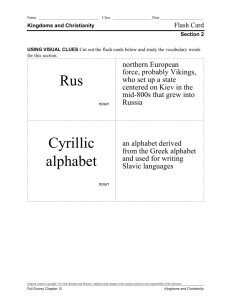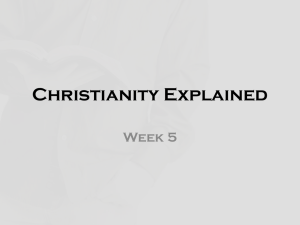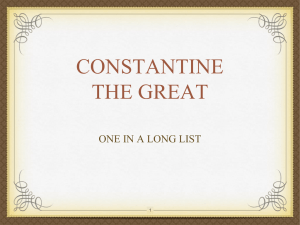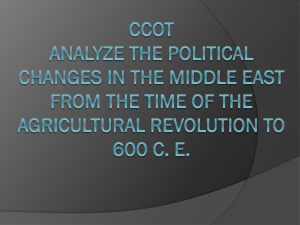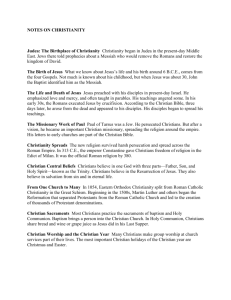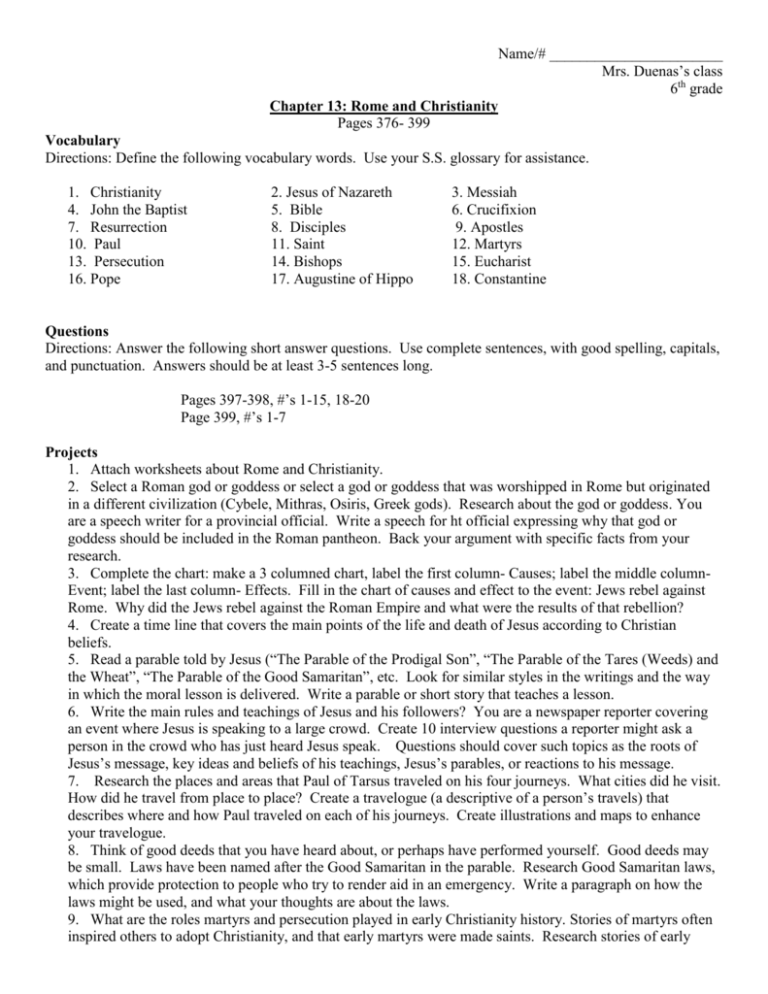
Name/# _______________________
Mrs. Duenas’s class
6th grade
Chapter 13: Rome and Christianity
Pages 376- 399
Vocabulary
Directions: Define the following vocabulary words. Use your S.S. glossary for assistance.
1. Christianity
4. John the Baptist
7. Resurrection
10. Paul
13. Persecution
16. Pope
2. Jesus of Nazareth
5. Bible
8. Disciples
11. Saint
14. Bishops
17. Augustine of Hippo
3. Messiah
6. Crucifixion
9. Apostles
12. Martyrs
15. Eucharist
18. Constantine
Questions
Directions: Answer the following short answer questions. Use complete sentences, with good spelling, capitals,
and punctuation. Answers should be at least 3-5 sentences long.
Pages 397-398, #’s 1-15, 18-20
Page 399, #’s 1-7
Projects
1. Attach worksheets about Rome and Christianity.
2. Select a Roman god or goddess or select a god or goddess that was worshipped in Rome but originated
in a different civilization (Cybele, Mithras, Osiris, Greek gods). Research about the god or goddess. You
are a speech writer for a provincial official. Write a speech for ht official expressing why that god or
goddess should be included in the Roman pantheon. Back your argument with specific facts from your
research.
3. Complete the chart: make a 3 columned chart, label the first column- Causes; label the middle columnEvent; label the last column- Effects. Fill in the chart of causes and effect to the event: Jews rebel against
Rome. Why did the Jews rebel against the Roman Empire and what were the results of that rebellion?
4. Create a time line that covers the main points of the life and death of Jesus according to Christian
beliefs.
5. Read a parable told by Jesus (“The Parable of the Prodigal Son”, “The Parable of the Tares (Weeds) and
the Wheat”, “The Parable of the Good Samaritan”, etc. Look for similar styles in the writings and the way
in which the moral lesson is delivered. Write a parable or short story that teaches a lesson.
6. Write the main rules and teachings of Jesus and his followers? You are a newspaper reporter covering
an event where Jesus is speaking to a large crowd. Create 10 interview questions a reporter might ask a
person in the crowd who has just heard Jesus speak. Questions should cover such topics as the roots of
Jesus’s message, key ideas and beliefs of his teachings, Jesus’s parables, or reactions to his message.
7. Research the places and areas that Paul of Tarsus traveled on his four journeys. What cities did he visit.
How did he travel from place to place? Create a travelogue (a descriptive of a person’s travels) that
describes where and how Paul traveled on each of his journeys. Create illustrations and maps to enhance
your travelogue.
8. Think of good deeds that you have heard about, or perhaps have performed yourself. Good deeds may
be small. Laws have been named after the Good Samaritan in the parable. Research Good Samaritan laws,
which provide protection to people who try to render aid in an emergency. Write a paragraph on how the
laws might be used, and what your thoughts are about the laws.
9. What are the roles martyrs and persecution played in early Christianity history. Stories of martyrs often
inspired others to adopt Christianity, and that early martyrs were made saints. Research stories of early
Christian martyrs (Stephen, Perpetua and Felicity, Peter, Paul, Ignatius of Antioch, etc). Write a short
paragraph on the role martyrs played in the early Christian church.
10. Select one of the following individuals who played an important role in the growth of Christianity:
Peter, Augustine, Constantine, Theodosius. Create a poster that explains the contributions of the person you
chose. Concentrate on how the individual helped to influence the growth of the Christian church.
11. Research at least 10 Christian Saints. What were their names, what were they known for, and how do
they help people today?
12. You are a reporter living in the 1st century A.D. Write several interview questions to prepare for writing
a newspaper article about Paul and his work. Compose a headline and a draft of the article.
13. You are a reporter living in the 1st century A.D. Write several interview questions to prepare for writing
a newspaper article about Paul and his work. Compose a headline and a draft of the article.
14. Write an essay comparing Christianity to one or more religions that you have already learned about.
15. Write 5 questions that you might have asked Constantine about Christianity.
16. Make a chart with the top label of Roman Emperors. Draw 3 boxes under this title and label each box:
Diocletian, Constantine, and Theodosius. Fill in details describing how each emperor helped Christianity to
grow.
17. You are an early monk or nun. Write an informative letter to someone who is thinking about becoming
a monk or a nun. Your letter should include information about your beliefs and lifestyle. Sign your name
using the Cyrillic Alphabet.
The Cyrillic Alphabet
The Cyrillic Alphabet was named for St. Cyril, although there is some dispute as to whether this is
the alphabet he invented or not. Cyril was a Greek monk who, with Methodius, brought written
language to Christian converts in the mid-9th century (c.860) in what is now Russia. The Cyrillic
alphabet is closely based on the Greek alphabet, with about a dozen additional letters invented to
represent Slavic sounds not found in Greek.
In Russia, Cyrillic was first written in the early Middle Ages in clear-cut, legible ustav (large letters).
Later a succession of cursive forms developed. In the early eighteenth century, under Peter the Great,
the forms of letters were simplified and regularized, with some appropriate only to Greek being
removed. Further unnecessary letters were expunged in 1918, leaving the alphabet as it is today—
still in use in many Slavic Orthodox countries.
(Letters in parenthesis indicate the English transliteration of the Cyrillic letters.)
© 1998 WETA. All rights reserved.

